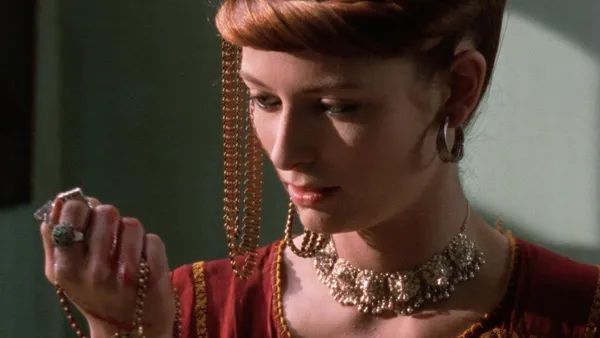Eye For Film >> Movies >> Friendship's Death (1987) Film Review
Friendship's Death
Reviewed by: Anton Bitel

Many years after the event, a journalist broadly sympathetic to the Palestinian cause reminisces with a friend (Patrick Bauchau) about his experiences in Amman, Jordan during the 'Black September' of 1970, when exiled Palestinian groups attempted to assassinate Jordan's King Hussein, dramatically blew up several hijacked planes on a Jordanian runway, and declared that a northern region of Jordan bordering Israel was now an autonomous Palestinian zone - only to be crushed in their thousands by the Jordanian military, with the survivors expelled to Lebanon.
Sullivan (Bill Paterson) was there when it happened, filing copy for a British newspaper from the relative safety of his room in a PLO-controlled hotel – but much of his time during those tempestuous days was spent getting to know a mysterious woman calling herself Friendship (Tilda Swinton), who was found wandering about, without papers or belongings, in a combat zone. She insists that she is an android sent from a distant galaxy on a peace mission, and that she was meant to land at MIT in Cambridge, Massachusetts to warn humankind of its imminent self-destruction.

As cynical about humans as he is sceptical about aliens, Sullivan enters a dialogue with Friendship over the next few days, in which life, sex, death, cartography, politics, desperation, sacrifice, technology, football and the very future of humanity are all on the agenda. Finally Sullivan leaves Friendship behind to face her own seemingly inevitable end, now that she has decided to join the Palestinian struggle – except that friendship can find strange ways to endure...
It is hard not to admire a film that manages, for all the shoestring meagreness of its budget, to be so broad in its ambitions. The 'action' (all talk, really) of Friendship's Death is confined to a tiny cast and a few interior sets, with every exterior shot lifted straight from public domain file footage. Yet writer/director Peter Wollen has somehow made two films, each with their own modestly grand idea. On the one hand, it is an outsider's political thought-piece on the plight of Palestinians, and by extension all other "victims of a map". On the other it is a quirky science fiction flick, informed in bare outline by other SFs from its decade (E.T.: The Extra-Terrestrial, The Terminator, even Blade Runner), but reduced, in part no doubt by financial constraints, to something altogether more peculiarly abstract.
Accordingly, like the televised football match that Sullivan and Friendship watch and discuss, this feature is very much of two halves – and as long as its mixed genre elements play a game that is strictly non-contact, everything runs smoothly. The mere combination of the Black September setting and a space traveller's puzzled presence is enough to suggest a fresh perspective on our human affairs, or even to open up an asymptotic association between Swinton's homeless alien and the Palestinians in exile. When, however, seemingly in contradiction to everything she has said earlier, Friendship suddenly announces her complete identification with, and conversion to, the Palestinian cause, Wollen appears to have started taking his own metaphors too literally, and the film loses both subtlety and sense.
Equally disappointing is the final sequence, purporting to be a message recorded by Friendship on space-age technology. This computer-generated montage of video fragments and fractal patterns is the only special effect to be found in the film, and was evidently intended to invoke the kaleidoscopic freak-out that closed 2001: A Space Odyssey – but lacking either genuine spectacle or obvious significance, it ensures that the film ends with a whimper.
At least there are the excellent performances of Paterson and Swinton to lend Friendship's Death a credibility it does not always deserve – and nothing can take away from the bizarre charm in the idea that even a device-loving replicant who admits to having "more fellow feeling" for a typewriter than for humans can still feel "slightly phobic" about the "loathsome" vacuum cleaner "because", she says, "it's a scavenger, a kind of mechanical rat, a roach." On second thought, though, doesn't that come close to the way that the Nazis caricatured Jews – and the way that the state of Israel now treats the Palestinians? No matter, it seems, how advanced we might become, hierarchy, fascism and persecution will always form a part of the political machine.
Reviewed on: 25 Apr 2009

















